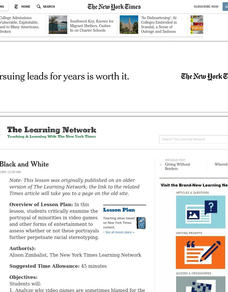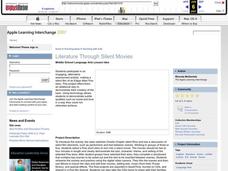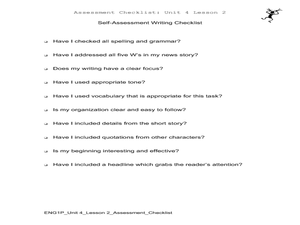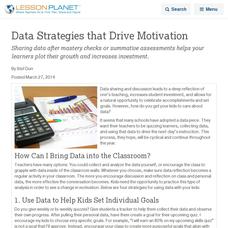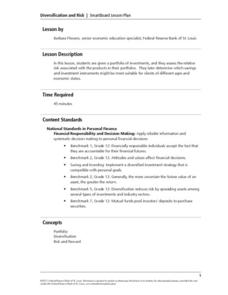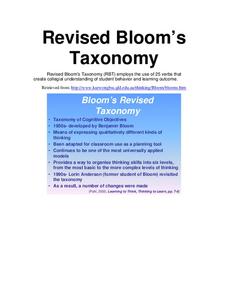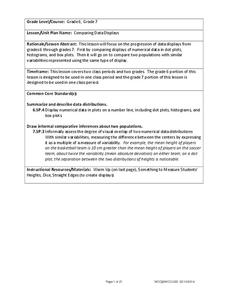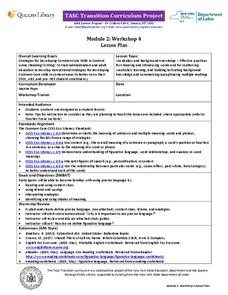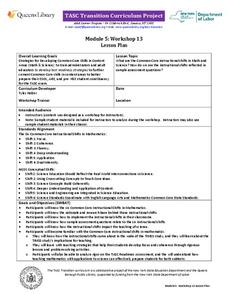Curated OER
Can Scientists Discover a Limit to Discovery?
Is there anything left to discover? Evaluate opposing sides of the debate regarding whether or not there is a future for scientific discovery. Middle and high schoolers assess quotations from the articles included to evaluate claims and...
Curated OER
Beyond Black and White
Students critically examine the portrayal of minorities in video games and other forms of entertainment and assess the role of racial stereotyping. They keep a log of media minority portrayals and respond to their findings.
Curated OER
When Art's a Craft
What would it be like to restore modern works of art? By acting as modern art conservators, learners assess the first-hand difficulties faced in restoration efforts. In addition, they create modern art pieces from random materials. Then,...
Curated OER
Egyptian Cartouche
Sixth graders demonstrate their knowledge of Earth clay construction by creating, inscribing, and glazing an earth clay Egyptian cartouche. The lesson culminates with learners sharing their knowledge of key terms in the lesson through...
Curated OER
Literature Through Silent Movies
Students participate in an engaging, alternative assessment activity: making a silent film of an Edgar Allen Poe story. This project offers them an additional way to demonstrate their mastery of the topic.
Curated OER
Galaxy Adventure
Working in groups, learners create a mnemonic device, give an oral presentation, and create a pictorial representation of the correct sequence of the planets and asteroid belt from the sun. An assessment rubric is included in the lesson.
Curated OER
Mapping the Brain
A virtual 3-D tour leads high schoolers to developing icons representing the function of various parts of the brain. These icons are then used to label hand-drawn maps of the brain. A worksheet, assessment, and detailed procedures are...
Curated OER
Physical Science: The Three Billy Goats Gruff
Explore science through problem solving and learning how to solve the problem of the story "The Three Billy Goats Gruff." Young investigators will learn how to construct a model and design a solution. They will also keep records of their...
Curated OER
Who Am I?
Your budding journalists need to understand the five W's for writing a news story. They read a story, complete several graphic organizers to help them organize and write their article, and then use a self-assessment worksheet to edit and...
Curated OER
"The Necklace" by Guy de Maupassant
After reading the short story "The Necklace" by Guy de Maupassant, give your readers this two-page packet to assess their reading comprehension. These are not your typical recall questions-instead, readers focus on the climax, types of...
Scholastic
Study Jams! Fractions
What can quesadillas teach your class about fractions? More than you might think. AJ and Zoe from the StudyJams! crew use this Mexican cuisine to explain how fractions are just equal parts of a whole, defining the key terms numerator and...
Curated OER
Data Strategies that Drive Motivation
Sharing data after mastery checks or summative assessments helps your learners plot their growth and increases investment.
Curated OER
Thrilling Information: Music and Reading
Here’s a cross-curricular program music activity that uses Peer Gynt to engage class members. Groups take one section of “In the Hall of the Mountain King,” choreograph their section of the tune to represent the story as they imagine it,...
National Endowment for the Humanities
The Argument of the Declaration of Independence
When in the course of a course on historic American events, it becomes necessary for learners to examine, with decent respect, the Declaration of Independence, it becomes evident that there are six separate and equal parts of that...
Carolina K-12
The Major Conferences of World War II
Young historians create a 1940's news radio broadcast on the five major World War II conferences, including the Atlantic, Casablanca, Tehran, Yalta, and Potsdam.
Federal Reserve Bank
Diversification and Risk
After being given a portfolio of investments, your young economists will learn how to assess the relative risk of the portfolio's products and understand the importance of diversification, relating these economic concepts to real-life...
Universiti Tunku Abdul Rahman
Revised Bloom’s Taxonomy
For decades Bloom's Taxonomy has helped to guide educators' approach to instruction, but as times change and students change, so too must the methods for teaching evolve. Introducing teachers to the new revised Bloom's Taxonomy, this...
West Contra Costa Unified School District
Comparing Data Displays
There is so much more to data than just numbers, and this resource has learners use three methods of comparing data in a multi-faceted lesson. The 21-page packet includes a warm-up, examples, an activity, and assessment for a complete...
ReadWriteThink
Literature Circles: Getting Started
Make reading more enjoyable and interactive with literature circles! Here you'll find detailed lessons to begin the literature circle process. Ten lessons introduce each role learners take on. Literature circle roles include...
Manitoba Education and Early Childhood Learning
Forensic Sciences: A Crime Scene Investigation Unit
Mr. Bergman has been murdered and we need you to solve the crime! The cross-curricular unit covers 11 different types of forensic science and includes 17 activities. Scholars perform blood type analysis, blood spatter analysis, height...
Street Law
The Challenge of Selecting an Ideal Supreme Court Nominee
Nearly every president has had the opportunity to name a nominee to the United States Supreme Court. But what makes someone an ideal candidate to become a Supreme Court justice? High schoolers test their prior knowledge about the Supreme...
New York State Education Department
TASC Transition Curriculum: Workshop 4
Why is it important to use precise language? Participants explore this question in the fourth activity in a series of 15 on effective instruction. Perfect for all content areas, the activity promotes appropriate language choice through...
New York State Education Department
TASC Transition Curriculum: Workshop 13
The six instructional shifts in this workshop definitely move math and science teachers' understanding of instruction. The workshop, 13th out of a series of 15, asks participants to examine sample tests and to look at how the six...
Core Knowledge Foundation
First Grade Skills Unit 4
Twenty-eight lessons make a unit that focuses on skills practice. Lessons explore r-controlled vowels, past tense verbs, nouns, adjectives, and two-syllable words. Pupils read a story, answer questions, and draft a descriptive essay...
Other popular searches
- Standards and Assessment
- Special Education Assessment
- Place Value Assessment
- Math Assessment
- Fitness Assessment
- Assessment Rubrics
- Self Assessment
- Assessment Tools
- Assessment Volleyball
- Math Assessment on Coins
- Reading Assessment
- Dance Assessment



